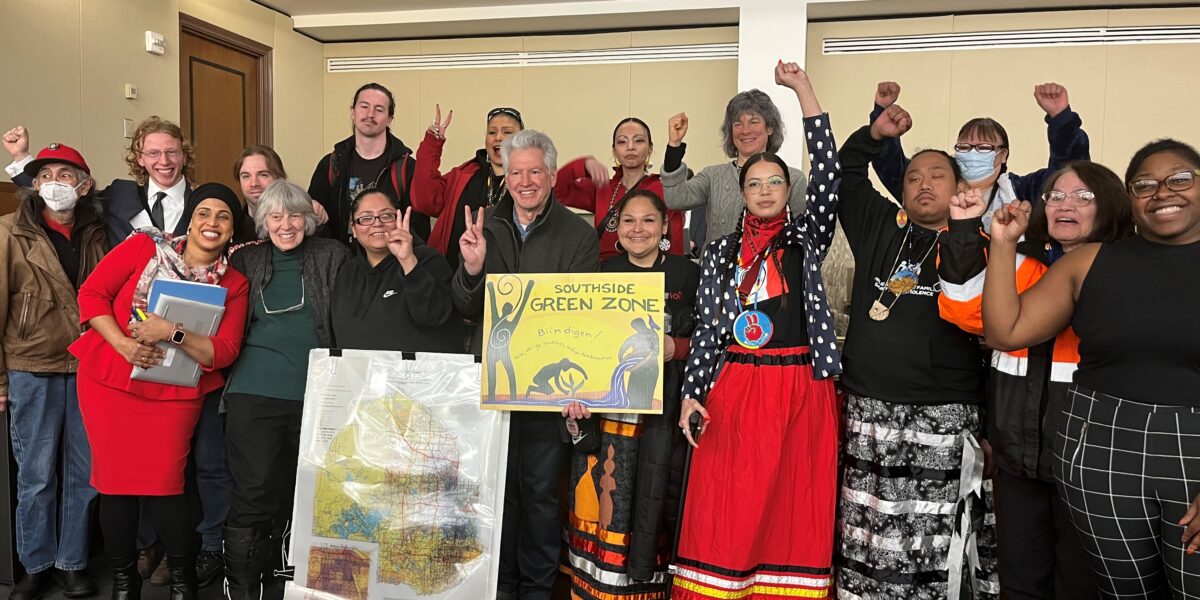Native Americans and south Minneapolis neighbors testify to state lawmakers, about funding for the East Phillips Neighborhood Institute, an organization leading the peaceful demonstrations against the Roof Depot warehouse demolition. They are advocating for their plan to create an indoor urban farm, and prevent increased pollution-related illnesses for people living nearby, including those living in Little Earth.
The East Phillips Neighborhood Institute plan to build an indoor urban farm development on the Roof Depot site is regaining some momentum. Not with the city of Minneapolis, but – with the Minnesota state legislature.
People supporting the development plan packed the House Economic Development Finance and Policy Committee hearing room to provide testimony on Wednesday, March 1, 2023.
The committee was weighing a bill that would provide a $20-million dollar grant to create their urban farm development.
People living in East Phillips say the proposal could reverse critical health and quality of life impacts from pollution that state agencies have documented, disproportionately hurting people living there.
Cassandra Holmes, a longtime resident of the Little Earth of United Tribes Native-preference housing development in East Phillips testified at the committee hearing. Holmes is an enrolled member of the Lac Courte Oreilles Band of Lake Superior Chippewa Indians. And, Director of the East Phillips Improvement Coalition.
“So we’re not just coming to you guys with all these facts, because they’re important believe you they are. But because we are burying our children, we’re burying our loved ones from environmental racism and injustice,” said Holmes.
The indoor urban farm project is the same proposal the city of Minneapolis rejected for the Roof Depot site. Instead, the council approved demolition there to expand a Public Works maintenance facility.
Demolition was scheduled to start at the end of last month, but a Hennepin County Judge put a pause on the plan and recommended the state Court of Appeals review environmental impacts of the project.
The leading Republican on the House Economic Development Finance and Policy Committee, Representative Jon Koznick of Lakeville raised objections to the bill that would provide a $20-million dollar grant to fund the urban farm project…
“There’s issues with the whole thing. Largest is that, you know, it’s gone through the courts, Courts of Appeals. You know, there’s talk about environmental issues that the city of Minneapolis has provided with the Department of Ag and the department of pollution control that the plan that they have to remediate that is sufficient. The courts have said as such. So I just not able to support this bill here,” he said during the hearing.
The Executive Director of the East Phillips Neighborhood Institute, Dean Dovolis addressed the committee’s Lead Republican, and his economic benefit concerns…
“…Based on the business we have, it generates the East Phillips neighborhood $600 million as part of it. And the genius of the thing, because this is a community vision, not mine. It’s run and managed by the community by nonprofit board. So this is an idea that allows a community to grow and develop a future that goes beyond the 20 million that’s in this bill that will give for generations thereafter,” said Dovolis.
Later in the hearing, former DFL state Representative Karen Clark, who lives in the neighborhood, testified as a board member of the East Phillips Neighborhood Institute to address why the legislature needed to get involved in a Minneapolis neighborhood issue.
“This legislature has voted twice before to help this community deal with the issue of environmental injustice two times. The first time was in 2008. When we pass legislation that was based on the fact that this area of Minneapolis East Phillips neighborhood has a very high disproportionate incidence of toxic exposure that causes public health problems,” said Clark.
In a roll call vote, the House Economic Development Finance and Policy Committee approved the bill to cheers. The bill passed six to five (6:5), to move forward to the House Capital Investment committee.
In the legal challenge to the city of Minneapolis’ Roof Depot demolition, the state Court of Appeals had not scheduled a review of its public works plan by the time we reported this story.
And, Minneapolis Mayor Jacob Frey’s office has not responded to multiple requests for an interview about this issue.
Isavela Lopez, Sam Choo and Emma Needham reporting for Minnesota Native News
Subscribe to Minnesota Native News in your favorite podcast app
- New Native Theatre’s 15th Year & REAL IDThis week, how REAL ID requirements impact Indigenous people, especially Two-Spirit individuals. Also, New Native Theatre’s latest play runs April 16-May 4.
- Ziigwan Biidaajimowin (Spring News): NACC Issues Call for Artists and Little Earth Kicks Off American Indian Month with a ParadeThis week, Minneapolis’s Native American Community Clinic (NACC) seeks artists to commission pieces for their new building. Plus, nearby, the Little Earth of United Tribes housing community will kick off May’s American Indian Month with a celebration organized in part by the Minneapolis Public Schools American Indian Youth Council, Ogichida Oyate


 A Journey to the Annual Red Lake Community Wellness Gathering
A Journey to the Annual Red Lake Community Wellness Gathering